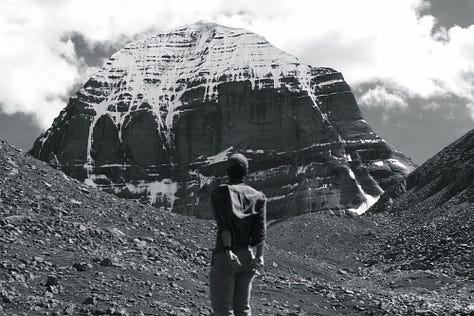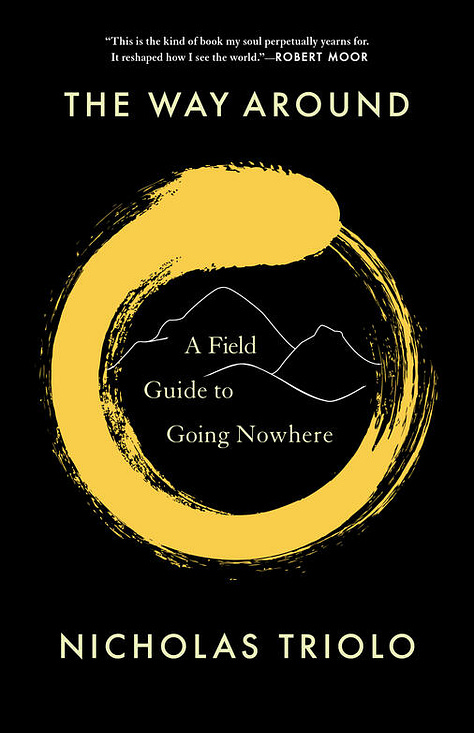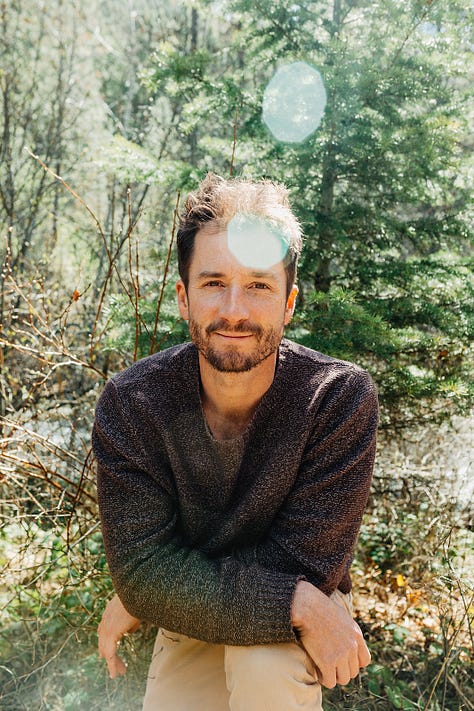Nick Triolo
Nick Triolo on dilating the circumference of the self, being an extension of the unfurling world, writing as a conversation with God, and why listening to strangers is the best kind of prompt.
I met Nick Triolo when he was working at Orion and edited a conversation between Leslie Jamison and me, “How to Write Love.” He is brilliant and kind and generous — and he can run really really far. He’s worked at Outside and Trail Runner and Orion, among other publications. He writes an incredible Substack filled with gold called “The Jasmine Dialogues.” Subscribe and you’ll hear about books, podcasts, music, writing, and ideas you won’t want to miss.
And Nick has a new book out July 8, 2025: The Way Around: A Field Guide to Going Nowhere. How’s that for a title? When he first described the book to me, when it was still in process, he told me it was about restraint as a spiritual practice — about not summiting mountains, but walking around them, circling them. The world could use more restraint. More spirituality. More careful reflection. And in a strange and beautiful coincidence, one of the places Nick circumambulates in this book is the enormous open-pit copper mine in Butte, Montana — a landscape that inspired (if that’s the right word) the novel I’m writing. You can read an excerpt of Nick’s book, “Around the Pit”, here.
I will be thinking about Nick’s answers to the NibLit three questions for a long time, and I know you will too. As Nick’s writing always does, his language steers me toward ways to be a better writer, and a better human.



Q: What brings you back to the desk? (Another way of asking: Why do you write?)
When I get up and bumble out of bed toward the coffee station, what comes next in terms of my writing practice is admittedly unromantic, but consistent. It most always happens in the morning. I’ve tried every other time of day and find this to be the sharpest. However, I am a seasonal critter in my output and so never excessively rigid. What brings me again and again to this routine is something akin to . . . a reminder. I think I’m writing to remember, to re-engage with how it is to be a thinking, feeling, reflecting, capacious citizen. Writing, along those lines, therefore becomes something of a ritual, I suppose, and having this self-imposed structure has always been good for my wildly curious (read: ADHD-adjacent) tendencies.
But the most honest answer I can offer is that what brings me back to the desk is that it makes me feel alive, engaged, connected with the ever-evolving world out there and the ever-unfolding universe in here, my own wild interiority that meets and is constantly shaped by the living world. Without writing I have very few places to exercise, this, to fold back in, to look back on having looked deeply and intently into the mysteries of the world. It’s a practice, a daily routine, and it’s hygienic: How am I doing? Where are coordinates of my heart today? Where’s the pulse?
I also have a pink Post-It note on my lamp that says two things. The first? WRITING IS HAVING A CONVERSATION WITH GOD, in all caps. God, I know, is perhaps the single-most loaded syllable in the English language, and it’s something I’m still trying to find comfort in, but it’s in writing where I think I’m starting to engage with my attention into the divine these days, and for that, art-making and practice becomes, if nothing else, something that’s bigger than me, bigger than my own hyper-individualized, a la carte ingenuity and cleverness, but rather something of an exchange with the unknowable.
That seems to take some pressure off—not all pressure, as I’m still navigating multiple deadlines and stalled-out drafts and general despair, let’s be real—but to know that drinking in the world and then having the luxury to render that spiritual irrigation through words and grace and calls for action, for unlearning and gaining a clear view, to know that it’s not all on my shoulders feels like a relief. And that’s, at the core, why I find myself showing up most mornings, to dilate the circumference of what I know to be the self by writing toward all the ways, all the relations, all the happenstance moments and travels and soundbites that urge me otherwise, to expand my definition of self through focusing on the most subtle vibrations of this weird, living fireball of a planet we found ourselves on.
Q: What sentence do you hear on repeat in your head that gets in your creative way – and what is your antidote sentence?
“You’re not smart enough; you’re no artist.” This hums in the background of most every moment of my creative life, this corrosive taunting that there are a million smarter, more authentic, more radical artists out there saying things in ways that are far more elegant and true and insightful than I ever could. I’ve been thinking recently how this is related to feeling as though I never have enough “context” to feel as though I could ever fully weigh in on a given topic, ever chime in and direct peoples’ attention to anything I have to say, as if nothing were worth sharing if it wasn’t something adequately novel and groundbreaking and culturally disruptive. This, I think, is an outgrowth of not trusting myself, not trusting my own right-sized contributions that only I can offer, which is to say, the particular way I’ve grown sensitive to the world. Not that my contributions are special, but, rather, to invert that by saying: the living, endlessly mysterious and fascinating world that’s never not unfolding in new and surprising ways meets my body, my heart, and my intellect in new and startling ways—that’s true for everyone—and so, to the extent that I can honor that, value that, celebrate that, trust that, and then share that from time to time, that, I think, is the antidote.
Trust your creative impulses. Trust them, not because you, dear separate-self individual, are some divine gift from God, but that you are an extension of an unfurling world getting to know itself in myriad ways, and you now have a responsibility to engage in that dialectic in your own erotic, intellectual, political sensitivities, in service to offering a niche-ecological vantage point, in service to the whole.
Q: What is your favorite writing prompt?
Last summer I taught at this pre-college creative writing summer program at Yale University, and I had all my students stalk people.
For a half hour I invited them to head out into New Haven and listen intently to the conversations strangers are having around them—in cafes, on the street, in the park—and then, with appropriate distance and respect to privacy, take notes. Not only on the contents of what they’re talking about, but on the subtle body language tones. The imperfections. The ambiguities. The paradoxes. What’s slightly at tilt about the dialogue? Is there are a power dynamic that feels curious to you? What does your intuition say about their contract of relating? First date? Married for ten years? Breaking up? What does your creaturely senses say about the situation? Is there a perfume that’s taking over the exchange? I have them “haunt” the situation for as long as they are able without being creepy (or getting arrested), take as many notes as they can by hand to capture specificity, and then go back to the class or somewhere quiet and write a story about the exchange. Using fragments of dialogue and details foraged, what might have been happening between the exchange? Play. Get weird. Think expansively. What all could have been unfolding in the conversation, using all available subtleties of the scene. Students have so much fun with this one. It’s always a little nerve-wracking when they go to my supervisor afterwards, all excited, and say: “Professor Nick had us stalking people today for class. It was AWESOME!”
Nick’s answers to these questions feel like medicine to me, like a balm. I’m also super curious what the second note on his post-it says, after his first, all caps, WRITING IS HAVING A CONVERSATION WITH GOD. (Tell us, Nick!) I think I believe that writing is having a conversation with God too. My mentor in graduate school, the late Gordon Kaufman, taught me that God is serendipitous creativity. He always reminded me that the God in Genesis is a poet and a potter, which, he said, doesn’t tell us very much about God, but it shows us what those writers thought about artists: They knew their work was world-making.
Yes, our work is world-making.
I’d love to hear what you think about Nick’s answers. What will you carry with you?
How does seeing yourself as an extension of the unfurling world shift your understanding of your creative work?
What’s your best guess for the second thing on Nick’s post-it?
Do you like to listen to strangers’ conversations? How does it help your writing practice?
Next up on NibLit: Laurie Frankel! She’s currently working on copyedits for her next book — lucky us! Her most recent novel Family Family breaks down unhelpful ways to think about adoption and opens new and life-giving narratives. She’s also the New York Times bestselling, award-winning author of four other books, including One Two Three and This is How It Always Is. And she loves to make soup.
Looking for more writing inspiration?
Check out Can We Listen to Something Deeper, a free workshop recording with special guest Pádraig Ó Tuama, host of Poetry Unbound (one of my favorite podcasts on the planet!).
Interested in Word Project Workshops?
Most of my writing workshops for 2025 have SOLD OUT. But don’t worry. There is still room in RIGHT TO WRITE, the monthly generative writing workshop series I offer. Two hours of generative writing prompts on a theme, every month. I love this workshop, and if you miss the live sessions, they are recorded.
There is also room in the upcoming WORD RIVER, which starts in August, though it it is almost sold out too! This workshop is limited to just 12 people. The RIVER is 6-months of twice-monthly workshops. If you’re looking to finish a project, if you’re looking for accountability and community, if you’re looking for ongoing support, this is for you.





Wow! Thank you for this post, Sarah. So much to think about in Nick's responses. I will be re-reading and pondering for some time.
“…you are an extension of an unfurling world getting to know itself in myriad ways… in service to the whole.”
Another beautiful, thought provoking read. Thank you for this gift - on what was a hard Monday, after a hard weekend. The world needs more of this x